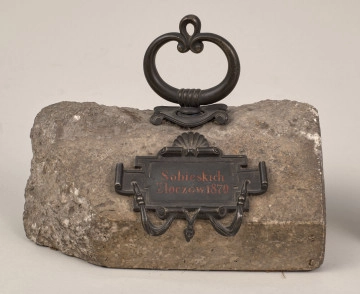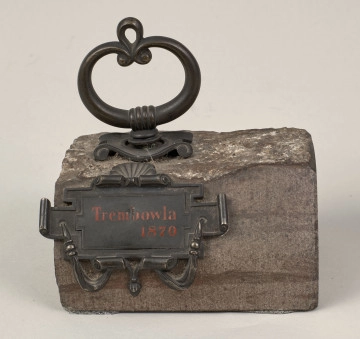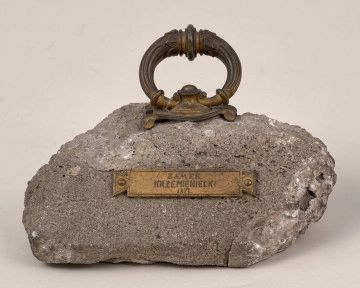
Paperweight
XIX century
Castle Museum in Łańcut
Part of the collection: Weapons, music instruments, varia
Paperweight – a gadget so ingenious in its simplicity. It helps you organize individual sheets of paper and prevents them from throwing. It could be made of any material, from wood to glass or metal to stone. There was only one condition: he had to effectively press the sheets of paper and at the same time does not leave any trace on them. It was often a souvenir brought back from a trip or associated with the memory of a person or an important event. Is it fair to say that a paperweight is a trinket? Yes, it is a very useful trinket of any shape except for its utility function, it decorates the room. The paperweight makers were only limited by their imagination. The paperweight could take the form of an exquisitely carved human or animal figure, a glass ball, a cast in metals, or it could be just an ordinary stone.
The paperweight that we present in our museum, was made of stone. It comes from the collection of the Potocki family taken over in 1944. It has the form of an irregular, partially ground lump of limestone. A brass handle has been added for ease of use. On the surface of the stone there are two engraved inscriptions: Tęczyński, Tęczyn and the date 1869 – so our paperweight is a souvenir associated with the Tęczyński family and Tęnczyn. But what do the Potocki family have in common with the Tęczyński family, Tęnczyn and the year 1869?
For over three hundred years, the Tęczyński family owned the Tęnczyn Castle, erected on the highest (411 m a.s.l.) hill of the Tenczyński Garb in the southern part of the Cracow-Częstochowa Upland. The construction of the castle began in 1350 by Jędrzej, voivode of Cracow and Sandomierz. Around 1570, the castle was rebuilt by the castellan of Wojnica and the Grand Chamberlain of the Crown Jan Tęczyński and transformed into a magnate residence. In 1638 the last descendant of the family in the male line, Jan Tęczyński, voivode of Cracow, died, and the entire estate was inherited by his daughter, Izabela, wife of Łukasz Opaliński. In 1656 the castle was burned down by the Swedes, who expected to find a supposedly hidden treasure there. At the beginning of the eighteenth century, Tenczyn passed into the hands of the Sieniawski family and then the Czartoryski family. From 1768, after a fire caused by a lightning strike, the castle fell into ruin. In 1816 the Potocki family became the owners of the castle and remained so until the outbreak of World War II. The castle is located on the Former Coal Mining Trail. On the north-eastern slope of the Castle Hill there was a mine founded by Baron Rosenberg-Lipski. In the years 1864 – 1869, the "Bolesław" mining shaft and the "Franciszek" mining adit were built in the vicinity of the castle. Traces of mining and ventilation shafts have been preserved to this day.
Anna Szczęsny
Author / creator
Object type
pamiątki
Technique
rzeźbiarskie
Material
limestone
Creation time / dating
Owner
Muzeum - Zamek w Łańcucie
Identification number
Location / status

XIX century
Castle Museum in Łańcut

nieznany
XIX century
Castle Museum in Łańcut

nieznany
Castle Museum in Łańcut
DISCOVER this TOPIC
National Museum in Szczecin
DISCOVER this PATH
Educational path
0/500

We use cookies to make it easier for you to use our website and for statistical purposes. You can manage cookies by changing the settings of your web browser. More information in the Privacy Policy.
We use cookies to make it easier for you to use our website and for statistical purposes. You can manage cookies by changing the settings of your web browser. More information in the Privacy Policy.
Manage cookies:
This type of cookies is necessary for the website to function. You can change your browser settings to block them, but then the website will not work properly.
WYMAGANE
They are used to measure user engagement and generate statistics about the website to better understand how it is used. If you block this type of cookies, we will not be able to collect information about the use of the website and we will not be able to monitor its performance.